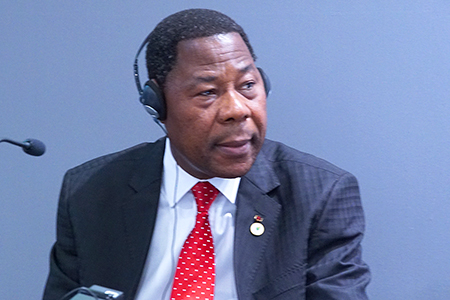Leaders commend ECA climate change work at COP 21

Leaders commend ECA climate change work at COP 21 Africa Pavilion inaugural
Paris France 1 December 2015 (ECA) – The president of Benin, H.E. Yayi Boni, today praised the intellectual leadership role that Dr. Carlos Lopes and his team at the United Nations Economic Commission for Africa (ECA) played in bringing content into the Africa Pavilion that was inaugurated this morning at the ongoing climate conference (COP 21) in Paris France.
Speaking at the ceremony, President Yayi Boni also thanked other development partners – the Africa Development Bank, the NEPAD Agency and the African Union Commission - for setting up “one of the most impressive pavilions at COP 21” and said that the seriousness of documents and positon papers prepared by ECA’s Africa Climate Policy Centre (ACPC) show that Africa has not come to COP 21 as beggars (financial or otherwise) but as a region ready to propose concrete solutions to climate change whose consequences “are burning our common house” – the planet.
Other keynote speakers at the event: Dr. Nkosazana Dlamini Zuma, Chair of the African Union Commission; Dr. Ibrahim Assane Mayaki, CEO of the NEPAD Planning Agency; as well as Dr. Akinwumi Adesina, President of the African Development Bank also had kind words for the Economic Commission for Africa.
Earlier, Dr. Carlos Lopes, UN Under-Secretary General and Executive Secretary of the Economic Commission for Africa addressed the audience in what observers dubbed Africa’s indisputable case for action at COP 21.
He made the case for the new climate framework to speak to Africa’s development priorities, as African countries have made and continue to make efforts to turn climate change challenges into development opportunities, in order to transform their economies for low-carbon and inclusive growth and prosperity.
The said that African economies depend heavily on climate-sensitive sectors, citing the 5th Assessment of the Intergovernmental Panel on Climate Change, IPCC, which confirms that without concerted global effort to curb runaway climate change, Africa will continue to suffer from increased extremes in its weather systems, increased water stress, reduced crop production and food security, increased health risks, land degradation and uncontrollable migration.
He also elaborated on the adverse effects that climate change has on Africa’s agriculture on which some 75 % of its people depend for their livelihoods.
“It is one of the most vulnerable sectors to the impacts of climate change and it is also a sector that has huge potential for international trade. As a result of climate change crop yields are generally projected to decrease across Africa, putting security at risk.”
“Therefore, the COP21 must deliver a fair climate deal for Africa”, he argued.
He called on African negotiators to speak with one voice and work tirelessly to ensure that the new climate agreement is a fair deal for Africa. “It is in this spirit that the Economic Commission for Africa, the African Union Commission, the African Development Bank and the NEPAD Planning and Coordinating Agency have come together to provide the Africa Pavilion at this a COP.
The Pavilion is a platform for coordination of events, interests and stakeholders as well as an intellectual hub for exchange and fusion of ideas on climate change and its implications for the continent. Most importantly, the Pavilion is a symbol of the unity of an Africa speaking with one voice on issues of common concern.
He said that with the momentum and successes arising from the Third International Conference on Financing for Development (FFD3) and the Sustainable Development Goals (SDGs), and given the underlying importance of climate change on development and finance, “it is indeed the case that the COP21 is too big a climate conference to fail!”
“This is particularly so for Africa whose long term development to meet the objectives of the continent’s Agenda 2063 is highly at risk from the adverse impacts of climate change, even though the continent contributes the least to the nearly 50 giga tons of global greenhouse emissions”, he added.
Dr. Carlos Lopes took the opportunity to address the concerns of some participants who have incessantly questioned what constitute Africa common positions at COP 21. He outlined at least 5 areas of common concern for the Continent:
- Ensuring that the agreement respects Article 2 of the UNFCCC to greenhouse gas concentrations in the atmosphere at a level that would prevent dangerous anthropogenic interference with the climate system; even 1.5 degrees could be too dangerous for Africa
- Respecting the Article 3 of the Convention with regard to the core principles of equity and common but differentiated responsibilities, the precautionary principle and the right to sustainable development
- Addressing the “polluter pays principle” and a balanced emphasis on adaptation and mitigation
- Operationalizing concrete actions to address loss and damage associated with climate change impacts
- Ensure appropriate, adequate and means of implementation covering finance, technology transfer, and capacity building
As countries submit, evaluate and implement their Intended Nationally Determined Contributions (INDCs), African countries need to recognise the opportunities for low-carbon development pathways for their national strategies, he advised.
President Yayi Boni is a known advocate for climate change adaptation and mitigation in Africa. At national level he launce the 10 Million Souls and 10 Million Tree Programme thanks to which Benin has planted over 10 million trees annually for the last three years. He is the only African president to have made a direct financial contribution towards the organisation of an African Pavilion at COP 21.
Issued by ECA Communication Service


